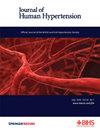Accuracy of semi-quantitative gold nanoparticle-based quick cortisol assay with and without adrenocorticotropic hormone infusion during adrenal vein sampling
IF 3.4
4区 医学
Q2 PERIPHERAL VASCULAR DISEASE
引用次数: 0
Abstract
Adrenal vein sampling (AVS) is the gold standard for diagnosing unilateral primary aldosteronism. Point-of-care rapid cortisol assays such as the gold nanoparticle based quick cortisol assay (QCA) are used to confirm accurate cannulation of the adrenal veins during the procedure and have improved AVS success rates. In this retrospective cohort study, we reviewed the results of consecutive AVS procedures (n = 37) performed with and without ACTH (synacthen) infusion between October 2020 and December 2022 at our institution. We compared (1) the accuracy of point-of-care QCA at semi-quantitatively assessing successful adrenal vein cannulation before and after ACTH infusion when compared with selectivity index based on laboratory cortisol measurements, (2) accuracy of QCA based on peripheral and adrenal vein cortisol levels and (3) the impact of time of day on the accuracy of QCA. We found the accuracy of QCA compared with formal laboratory cortisol measurements was 71% pre-ACTH and 100% post-ACTH (p-value < 0.001). Pre-ACTH, the accuracy of QCA was higher in the lowest (28–257 nmol/L) and highest (466–25130 nmol/L) adrenal vein cortisol tertiles compared to the mid-tertile. Post-ACTH, the accuracy of QCA remained high regardless of adrenal vein cortisol levels. Time of day did not affect the accuracy of the QCA. We conclude that during basal AVS subjective, visual estimates of adrenal vein cortisol levels using the QCA semi-quantitively should not be solely relied upon to guide catheter placement. These results will help guide clinicians in the appropriate clinical situations in which QCA should be used during AVS.在肾上腺静脉取样时输注促肾上腺皮质激素,基于金纳米颗粒的半定量快速皮质醇测定的准确性。
肾上腺静脉取样(AVS)是诊断单侧原发性醛固酮增多症的金标准。即时快速皮质醇测定,如基于金纳米颗粒的快速皮质醇测定(QCA),用于确认手术过程中肾上腺静脉的准确插管,并提高了AVS的成功率。在这项回顾性队列研究中,我们回顾了2020年10月至2022年12月期间在我院连续进行的有和没有ACTH (synacthen)输注的AVS手术(n = 37)的结果。我们比较了(1)与基于实验室皮质醇测量的选择性指数相比,护理点QCA在半定量评估ACTH输注前后肾上腺静脉插管成功的准确性;(2)基于外周和肾上腺静脉皮质醇水平的QCA准确性;(3)一天中的时间对QCA准确性的影响。我们发现,与正式的实验室皮质醇测量相比,QCA的准确性为acth前71%,acth后100% (p值)
本文章由计算机程序翻译,如有差异,请以英文原文为准。
求助全文
约1分钟内获得全文
求助全文
来源期刊

Journal of Human Hypertension
医学-外周血管病
CiteScore
5.20
自引率
3.70%
发文量
126
审稿时长
6-12 weeks
期刊介绍:
Journal of Human Hypertension is published monthly and is of interest to health care professionals who deal with hypertension (specialists, internists, primary care physicians) and public health workers. We believe that our patients benefit from robust scientific data that are based on well conducted clinical trials. We also believe that basic sciences are the foundations on which we build our knowledge of clinical conditions and their management. Towards this end, although we are primarily a clinical based journal, we also welcome suitable basic sciences studies that promote our understanding of human hypertension.
The journal aims to perform the dual role of increasing knowledge in the field of high blood pressure as well as improving the standard of care of patients. The editors will consider for publication all suitable papers dealing directly or indirectly with clinical aspects of hypertension, including but not limited to epidemiology, pathophysiology, therapeutics and basic sciences involving human subjects or tissues. We also consider papers from all specialties such as ophthalmology, cardiology, nephrology, obstetrics and stroke medicine that deal with the various aspects of hypertension and its complications.
 求助内容:
求助内容: 应助结果提醒方式:
应助结果提醒方式:


